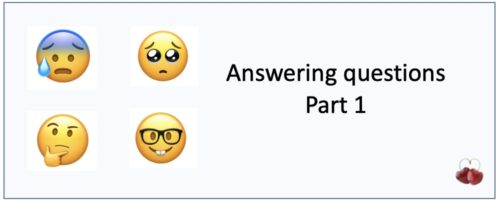51 – Answering questions
Years ago, I was very timorous about the questions people would ask at the end of a talk, as I felt they would find a weak link or even a severe fault in my presentation. And their finding it would leave me gasping in panic, red-faced with embarrassment, my credibility shot to pieces, my cover blown.
But the older I get the more confident I get that I’ve got a good, helpful reply somewhere in my locker. I (now) love it when people ask questions. The questions-from-the-audience part of any talk or workshop is something that I now really enjoy (most of the time).
That doesn’t mean that I am happy with every answer I give – the ones that went wrong I still remember with acute embarrassment. But I love it most when someone asks a question from a point of view that I have not thought of, and I find that the questioner has knocked on a door that I didn’t know existed, but behind which a previously un-thought-of proposition emerges in reasonably good order to serve as an answer.
One such question came from a participant at a workshop I gave at the University of Birmingham last year. The question was ‘Which type of Jungle speech do you most dislike?’ (to understand this question, you need to know about the botanic metaphor of the Greenhouse, the Garden and the Jungle – see here).
It has never occurred to me to dislike any aspect of the Jungle (fast messy normal everyday spontaneous speech) the messier it gets, the happier I get: I am reassured that there is something to describe and make teachable/learnable.
So how did I answer this one? Well I said that there is nothing about the Jungle that I dislike, but that if I have a dislike of anything, it is that ELT treats the norms of the Garden (careful, rule-governed, sentence-twinned intelligible speech) as if they are the complete picture of what is true of all speech. In the garden, connected speech rules hold sway. And in ELT, we have had only the rules of connected speech as our metalanguage to help us cope with naturally occuring speech.
Don’t get me wrong, these rules are a helpful first step in explaining what happens when word meets word in phrases and sentences in the genteel circumstances of written text read aloud. But the set of such rules that we operate with in ELT are too much oriented towards the tidy rule-governed styles of speech: they cannot cope with the messiness of everyday spontaneous speech. We need to relish, describe, and teach the mess so that our students can become familiar and comfortable with such speech, so that the task of listening and understanding fast normal everyday speech is made much easier than it currently is.
The next post will concern a reply with which I am not so happy.
More on relishing the messy here.


